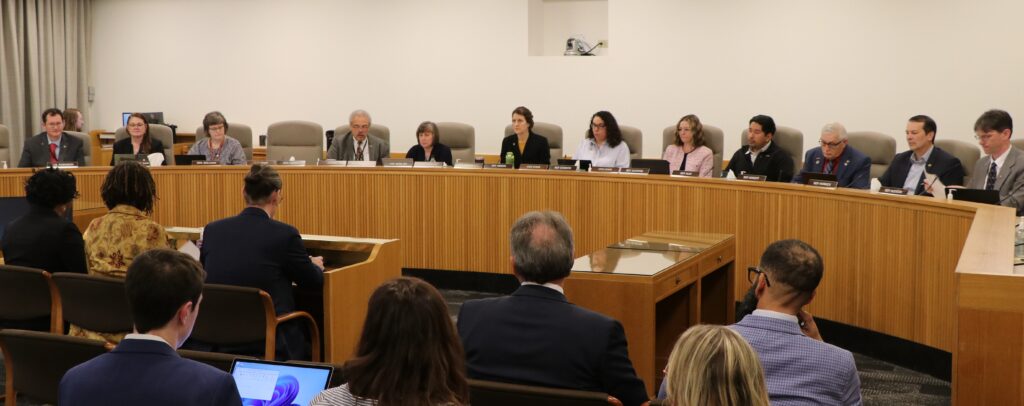
A rare joint meeting of the Senate and House education committees heard testimony from the Oregon Department of Education on Wednesday about education accountability legislation. (Photo by Jake Arnold, OSBA)
A special joint legislative hearing Wednesday night probed education accountability legislation. The House and Senate education committee members had more questions than time, though, promising additional hearings for House Bill 2009 and Senate Bill 141.
Gov. Tina Kotek has tied her school funding proposals to implementing additional accountability measures, which took shape as the identical measures House Bill 2009 and Senate Bill 141.
Only one will proceed, but having a bill in each chamber gave both policy committees an opportunity to have hearings before one of the bills makes the required advancement to the Joint Ways and Means Committee.
There has been a hearing in each individual committee, plus the joint hearing. Those haven’t been enough for legislation that has been a primary focus of the governor’s office and education advocates. At the close of Wednesday’s hearing, House Education Committee Chair Rep. Courtney Neron said she planned to hold another public hearing Monday, April 7, to give more stakeholders a chance to weigh in.
With amendments, the measures would set new performance targets for schools. Districts that fell short would face intensive coaching from the Oregon Department of Education. ODE would take control of up to 25% of a district’s budget as well as its Student Investment Account grants if the district failed to improve.
The measures also put pressure on ODE to reduce districts’ administrative burden, to be more transparent and to hire enough qualified staff to assist underperforming districts.
Education advocates and associations, including OSBA, have met for months with the governor’s office to craft a bill that would give school districts the support and guidance to reach reasonable metrics.
A second proposed amendment to the House bill posted Tuesday added some details but still fell short of advocates’ calls for clearly defined goals, steps, supports and timelines.
Accountability was one of OSBA’s three legislative priorities for this session, and Executive Director Emielle Nischik has repeatedly said OSBA fully supports shared accountability “when we are measuring the right things with the right supports.”
OSBA, along with education partners, have so far registered support for the bills’ goals but with reservations about the specifics.
“Schools invite being held accountable because helping students succeed is their top priority,” Nischik said. “We need partners, because elevating our students is a shared responsibility.”
On Wednesday night, ODE Director Dr. Charlene Williams testifying before the committees acknowledged the challenge and the need to make thoughtful changes.
“Our student outcomes are not where they need to be,” she said. “We want to break out of old patterns.”
A panel of ODE administrators walked the committees through the work ODE is doing to prepare to support districts, from planning to align and reduce reports to hiring necessary coaches and stewards in the years to come.
“Accountability can’t happen if we don’t have coherence,” said Tim Boyd, ODE district and school effectiveness director. “We are working hard on building that coherence, which will be the accelerant toward improved outcomes for kids.”
The House Education Committee grilled Williams and Boyd during a March 10 hearing on HB 2009. Legislators were particularly intent on questioning whether ODE has the capacity and experienced professionals to offer schools effective support.
The Senate Education Committee public hearing March 12 on SB 141 featured presentations from Kotek and ODE on the bill as well as education advocate testimony but left no time for questions.
The Wednesday night hearing was scheduled for an hour, and legislators were visibly frustrated that there was only 20 minutes left for questions after ODE’s presentation.
Bills must move out of policy committees by a session deadline of April 9, but Senate Education Committee Chair Lew Frederick assured a colleague that committee leaders are looking at ways to continue the discussion.
“There are deadlines and then there are deadlines,” he said.
– Jake Arnold, OSBA
[email protected]